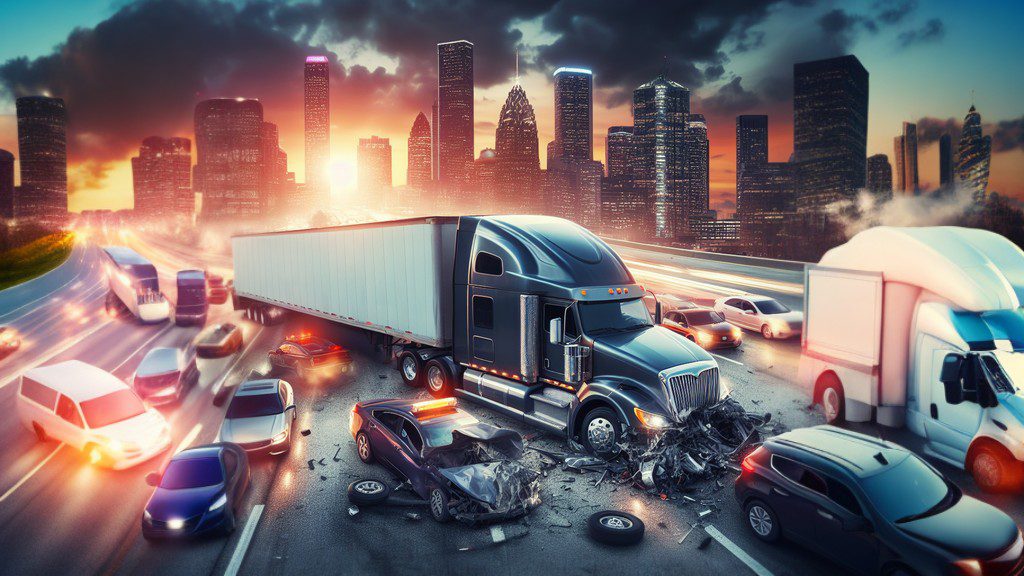Houston, Texas, a bustling city known for its vibrant energy and extensive road networks, unfortunately witnesses its fair share of 18-wheeler accidents. These accidents involving large trucks often result in severe consequences, raising concerns about safety and legal complexities. In this article, we explore the nuances of 18-wheeler accidents in Houston, the legal landscape surrounding them, and the pivotal role played by 18-wheeler accident lawyers.
Introduction
As the fourth-largest city in the United States, Houston’s roadways are constantly filled with various vehicles, including large commercial trucks. Among these, 18-wheelers stand out, not just in size but also in the potential risks they pose. The frequency of 18-wheeler accidents in Houston highlights a pressing need for legal guidance to navigate the aftermath of these incidents effectively.
Understanding 18-Wheeler Accidents
18-wheeler accidents are distinct from regular vehicle collisions due to the sheer size and weight of these trucks. Common causes include driver fatigue, mechanical failures, and challenging road conditions. The consequences are often severe, with injuries ranging from moderate to life-threatening and, tragically, sometimes resulting in fatalities.
Legal Implications in Houston, Texas
Texas, like many states, has specific regulations governing commercial trucking to ensure safety on the roads. Determining liability in 18-wheeler accidents, however, can be complex. Factors such as driver negligence, vehicle maintenance, and adherence to safety regulations all play a role in these cases.
Also Read: Seeking Justice: The Vital Role of a Dallas Burn Injury Lawyer
The Role of an 18-Wheeler Accident Lawyer
In the aftermath of an 18-wheeler accident, seeking legal representation becomes crucial. Specialized 18-wheeler accident lawyers possess the knowledge and experience necessary to navigate the intricate legal landscape in Texas. Their expertise extends beyond general personal injury law, focusing on the unique challenges presented by accidents involving large commercial trucks.
Immediate Steps After an 18-Wheeler Accident
After an 18-wheeler accident, individuals should prioritize their health and safety. Seeking medical attention is paramount. Simultaneously, consulting with an 18-wheeler accident lawyer promptly ensures that necessary evidence is preserved, and the victim’s rights are protected from the outset.
Pursuing Compensation for 18-Wheeler Accidents
Victims of 18-wheeler accidents are entitled to various forms of compensation, including medical expenses, lost wages, and pain and suffering. 18-wheeler accident lawyers work diligently to build strong cases, negotiating with insurance companies and, if necessary, representing clients in court to secure fair compensation.
Real-Life Cases: Successful Outcomes
Real-life case studies serve as powerful testimonials to the effectiveness of 18-wheeler accident lawyers. These stories illustrate instances where victims not only received justice but also obtained fair compensation for their injuries. Successful outcomes underscore the importance of seeking the assistance of a specialized 18-wheeler accident lawyer.
Building Trust: The Attorney-Client Relationship
Trust and effective communication form the foundation of the attorney-client relationship. 18-wheeler accident lawyers prioritize building a supportive environment where clients feel heard and understood. Transparent communication ensures that clients are informed about the progress of their case, fostering confidence and collaboration.
Advocacy for Safety
Beyond individual cases, 18-wheeler accident lawyers actively contribute to advocacy for safety measures. Through awareness campaigns and community engagement, these lawyers work towards preventing 18-wheeler accidents. Their commitment extends beyond legal representation, demonstrating a dedication to the well-being of the community.
Also Read: Empowering Victims: The Essential Role of a Dallas Semi-Truck Accident Attorney
Legal Resources and Support
Recognizing that the impact of an 18-wheeler accident extends beyond legal needs, 18-wheeler accident lawyers connect victims with additional resources and support. Whether it’s accessing medical assistance, counseling, or support groups, these attorneys prioritize addressing the broader well-being of their clients. The goal is to provide comprehensive support during the recovery process.
Conclusion
In conclusion, the role of an 18-wheeler accident lawyer is paramount for individuals navigating the aftermath of an 18-wheeler accident in Houston, Texas. From the complexities of legal proceedings to the emotional and financial toll, 18-wheeler accident lawyers provide compassionate support and effective advocacy. Victims are encouraged to seek the assistance of these specialized attorneys to ensure that their rights are protected, and justice is served.
FAQs
1. Why is it crucial to hire an 18-wheeler accident lawyer after an 18-wheeler accident in Houston?
- Answer: Hiring an 18-wheeler accident lawyer is crucial due to their specialized knowledge of Texas laws and the complexities surrounding 18-wheeler accidents, ensuring victims receive fair compensation.
2. What immediate steps should I take after an 18-wheeler accident?
- Answer: Seek immediate medical attention, document the incident, and consult with an 18-wheeler accident lawyer promptly to protect your rights.
3. How do 18-wheeler accident lawyers contribute to preventing 18-wheeler accidents?
- Answer: 18-wheeler accident lawyers actively engage in advocacy, awareness campaigns, and safety initiatives to prevent 18-wheeler accidents and promote workplace safety.
4. What types of compensation can an 18-wheeler accident lawyer help me pursue?
- Answer: An 18-wheeler accident lawyer can help pursue compensation for medical expenses, lost wages, pain and suffering, and other damages resulting from an 18-wheeler accident.
5. Are there resources available for 18-wheeler accident victims beyond legal assistance?
- Answer: Yes, 18-wheeler accident lawyers can connect victims with additional resources such as medical assistance, counseling, and support groups.







